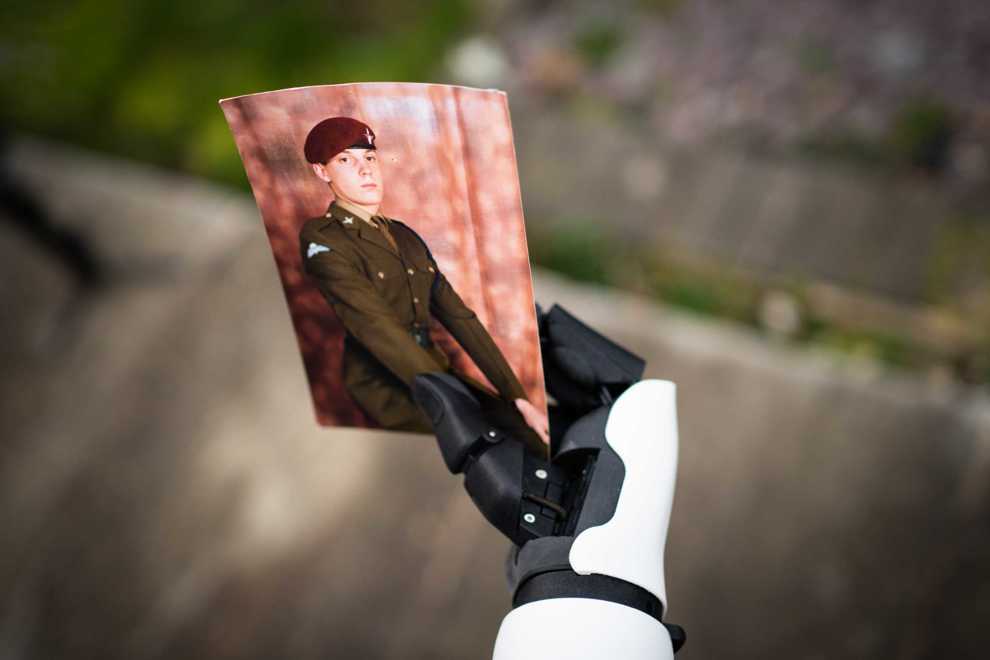On Wednesday 29th of January Blesma Member Darren Fuller became the first veteran to receive a ‘Hero arm’; the world's first clinically approved 3D-printed bionic arm.
Designed by Open Bionics, the Hero Arm is a lightweight and affordable myoelectric prosthesis, with a wide range of grip styles. It’s functions range from pinch grips to thumbs up and everything in between. It is available now in the USA, UK and France for below-elbow amputee adults and children aged eight and above. Open bionics develops medical devices that enhance the human body.
Blesma's in-house prosthetics expert, Brian Chenier, was instrumental in helping Darren become the first veteran outfitted with the bionic hand.
Darren served with the Parachute Regiment for 20 years and was injured whilst serving in Afghanistan, causing him to lose his right arm below the elbow. He was initially attracted to the Hero Arm after seeing an article about it in the Blesma Magazine, which picked up on how lightweight the device was. Following this, he and Brian started looking into obtaining one for Darren through the Veterans Prosthetics Panel.
Before getting the Hero arm, Darren would typically wear a driving adaptation throughout the day- especially as he does a lot of driving in his role as a Blesma Outreach officer. He had tried other myoelectric hands, but found these to be too heavy and unwieldy. Their typically high price point was also a factor.
“It was mostly the heavy weight that stopped me from using the other myoelectric arms I’d tried. I found it uncomfortable, and why have such an expensive arm sitting around because I rarely use it? I don’t want to waste the money, and would rather someone else had the opportunity to use it in that case. The Hero Arm is a quarter of the price and much lighter.”

A number of trial sessions held at Harold Wood Long Term Conditions Centre gave Darren the opportunity to try the Hero Arm and decide if it was suitable for him. He was then ready to receive the prosthesis and demonstrate it’s functionality. Firstly, by stacking wooden blocks.
There was quite an audience gathered, including Blesma staff, representatives of Open Bionics and a large group of curious prosthetists. Nonetheless, Darren took to using the arm almost immediately and had quickly built an impressive tower. However he rightly said that “The real test begins at home”.
Having tried myoelectric prostheses before, Darren had a starting point to compare the arm against- but was very impressed nonetheless. “It's great to move the thumb to a wide range of angles, it is a more sensitive device than those I have tried before. I just wish I could have had something like it when my daughter was younger- it would have helped a lot with changing nappies!”
The device has been predominantly aimed at children so far, as its low cost makes it suitable for replacing and adjusting as they grow. The Hero Arm, true to its name, also comes with the ability to be personalised with interchangeable covers in a wide variety of patterns, some of which are based on popular super-heroes.
Darren opted for a white cover and a black cover which he can mix and match- so it can blend in where he wears a Tuxedo. Ever the gentleman, he is excited to have the Hero Arm not just for himself, but for his daughter.
“I can't wait to get home and try loads of everyday stuff, but firstly shaking my little girls’ hand. I'm saving my first handshake for her. I hope that she’ll be able to hold hands with it, so she can always walk on the inside of the pavement.”
Brian Chenier, Blesma’s Prosthetics Support Officer, facilitated the provision of this arm through the Veterans Prosthetics panel. This is the first time the Hero Arm has been funded by the VPP, so Brian’s role was one of ‘connecting the dots’ by bringing the device to the Panel and securing the agreement in principal, and then further liaising with Open Bionics to secure a trial arm. The process of application took nearly two years.
He said; “Today not only marks a good day for Darren but it potentially paves the way for other Military Veterans to try the Hero Arm funded through the Veterans Prosthetic Panel. In time this could lead to wider use within the NHS for civilian amputees as we have seen with Microprocessor Controlled Knees which were widely provided to amputee Veterans following recent conflicts.”
“It is great to see how quickly Darren has learnt to control the Hero Arm as increased function was his key goal. It looks amazing too, which is really important for a lot of people living with limb loss.”
How do I contact the Prosthetics Support Officer?
We can help
We are dedicated to assisting serving and ex-Service men and women who have suffered life-changing limb loss or the use of a limb, an eye or sight. We support these men and women in their communities throughout the UK. Click the link below to find out the different kinds of support we offer.
Get Support
Leave a comment
Join fellow Members and supporters to exchange information, advice and tips. Before commenting please read our terms of use for commenting on articles.